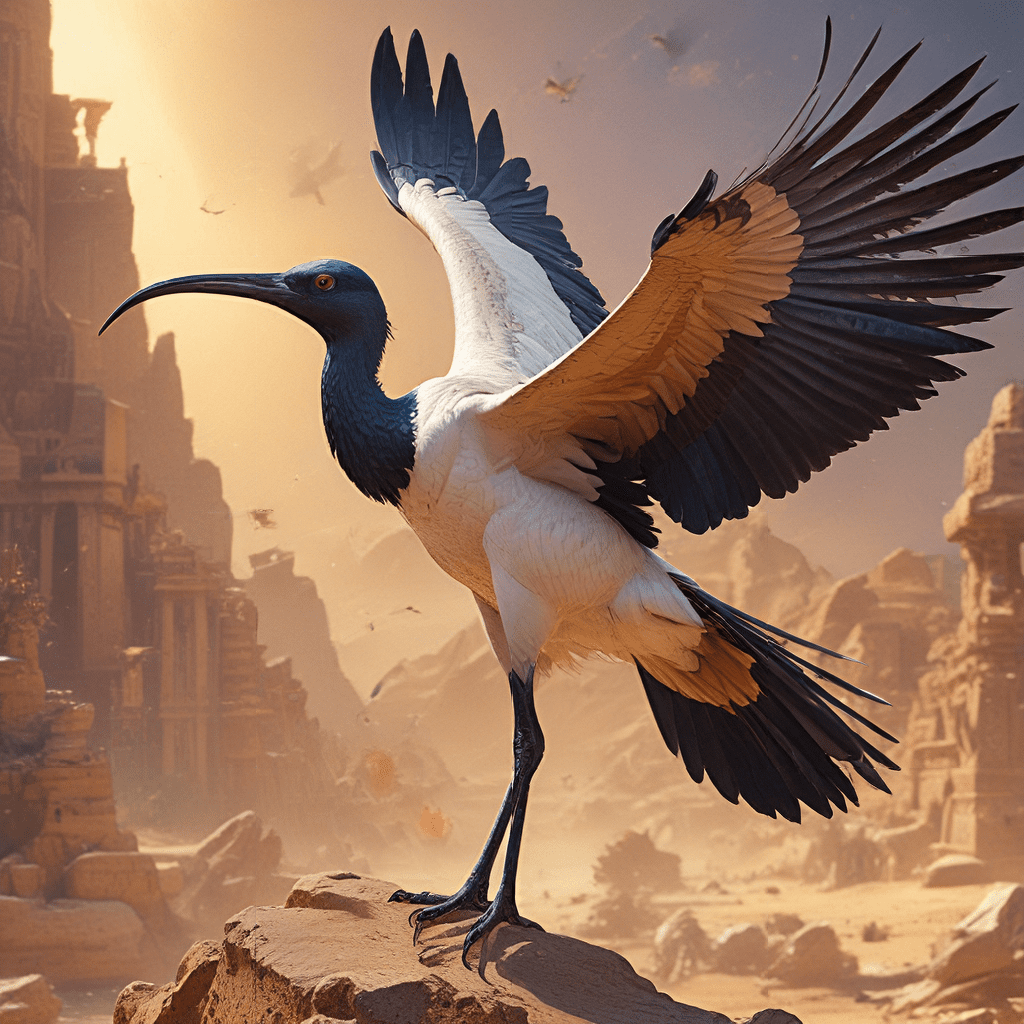The Sacred Ibis: A Bird of Wisdom and Magic in Ancient Egypt
In the rich tapestry of ancient Egyptian culture, the ibis holds a special place as a sacred bird, deeply intertwined with the realms of wisdom, magic, and the divine. Its association with the god Thoth, a central figure in Egyptian mythology, elevated the ibis to a revered status, making it a symbol of knowledge, writing, and the cosmic order.
1. Introduction: The Ibis in Ancient Egyptian Culture
The ibis, specifically the African sacred ibis (Threskiornis aethiopicus), was a common sight in ancient Egypt, inhabiting the wetlands and Nile River banks. Its distinctive black plumage, long, curved beak, and elegant gait made it a striking bird, capturing the attention of the Egyptians. The ibis’s association with Thoth, the god of wisdom, magic, writing, and the moon, transformed this bird from an ordinary creature into a sacred symbol.
2. The Ibis as a Symbol of Thoth: The God of Wisdom, Magic, and Writing
Thoth was a multifaceted deity, embodying the power of knowledge, learning, and the creative force of the universe. He was the scribe of the gods, responsible for recording the decrees of the divine. Ancient Egyptians believed that Thoth created the written language, invented the arts and sciences, and oversaw the celestial movements. The ibis, with its keen eyesight and intelligence, was deemed a perfect representation of Thoth’s wisdom.
In art and mythology, Thoth is often depicted with the head of an ibis, signifying his divine intellect and connection to the bird’s symbolic attributes. The ibis’s long, curved beak was seen as an embodiment of Thoth’s power to create and write.
3. The Ibis and the Creation Myth: Thoth’s Role in the Birth of the World
In Egyptian creation myths, Thoth played a pivotal role in the birth of the world. His association with the ibis contributed to this narrative. Legend has it that Thoth emerged from the primordial waters, bringing order and knowledge to the chaotic universe. He was credited with creating the laws of nature, the calendar, and even the stars in the sky.
The ibis, being a symbol of Thoth, became associated with this creative power, representing the birth of knowledge and order from the primordial chaos.
4. The Ibis as a Guardian of Knowledge and Learning
The ibis’s association with Thoth extended to the realm of learning and knowledge. Ancient Egyptians believed that the ibis possessed a profound understanding of the universe and possessed magical powers. They held the ibis in high esteem, believing that it could help them acquire wisdom and achieve intellectual enlightenment.
Ibis feathers were often used as writing quills and in rituals dedicated to Thoth, symbolizing the power of language and the quest for knowledge. The ibis’s presence at temples and schools served as a reminder of the importance of education and the pursuit of wisdom.
5. Ritualistic Significance of the Ibis: Mummification and Offerings
The sacred status of the ibis was reflected in the rituals and practices surrounding the bird. Mummified ibis remains have been found in vast quantities, indicating their importance in religious ceremonies. These mummies were often buried in special cemeteries or within sanctuaries dedicated to Thoth.
Offerings of food and incense were made to ibis statues and mummies, symbolizing the Egyptians’ deep reverence for the bird and its connection to the divine. These rituals served to honor Thoth and seek his favor, believing that he would grant wisdom and knowledge to those who paid homage to him.
6. The Ibis in Egyptian Art and Literature: Depictions and Stories
The ibis is a recurring theme in Egyptian art and literature. It is featured in paintings, sculptures, and carvings, often in conjunction with Thoth. These depictions illustrate the ibis’s significance as a symbol of wisdom, magic, and the divine.
Stories and myths about the ibis and its connection to Thoth abound in Egyptian texts. These tales often depict the ibis as a wise and benevolent creature, guiding humanity towards knowledge and enlightenment.
7. The Ibis Colony at Hermopolis: A Sacred Site Dedicated to Thoth
Hermopolis, an ancient Egyptian city located in Middle Egypt, was a major center of worship for Thoth. The city was known for its large ibis colony, which was considered to be sacred.
The ibis colony at Hermopolis was a testament to the enduring connection between the bird and Thoth. The presence of the ibis at this site reinforced the city’s role as a center of learning and knowledge.
8. The Ibis as a Symbol of Balance and Order
Beyond its connection to wisdom and knowledge, the ibis also represented balance and order in the cosmos. In ancient Egyptian beliefs, the celestial bodies, including the moon, were believed to influence human affairs.
The ibis’s association with Thoth, who was also the god of the moon, linked the bird to this cosmic order. The ibis’s presence in the sky, soaring above the earth, was seen as a symbol of balance and harmony in the universe.
9. The Ibis in Modern Egyptian Culture: Legacy and Significance
The ibis continues to hold a significant place in modern Egyptian culture. Its image is still used in art, literature, and other cultural expressions, reflecting its enduring legacy.
The ibis remains a symbol of wisdom, knowledge, and the pursuit of enlightenment, a legacy that has transcended time and continues to inspire people today.
10. Conclusion: The Enduring Power of the Sacred Ibis
The sacred ibis of ancient Egypt was more than just a bird; it was a symbol of the divine, representing wisdom, magic, and the cosmic order. Its association with the god Thoth elevated this creature to a revered status, making it an integral part of Egyptian culture, mythology, and belief systems.
The ibis’s enduring power lies in its ability to inspire and remind us of the importance of knowledge, learning, and the pursuit of intellectual enlightenment. Its legacy continues to resonate in modern Egyptian culture, reminding us of the rich and enduring heritage of this ancient civilization.




